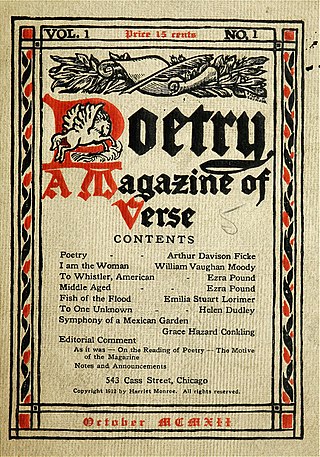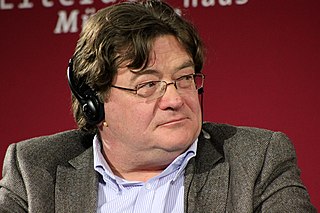
Harriet Monroe was an American editor, scholar, literary critic, poet, and patron of the arts. She was the founding publisher and long-time editor of Poetry magazine, which she established in 1912. As a supporter of the poets Wallace Stevens, Ezra Pound, H. D., T. S. Eliot, William Carlos Williams, Carl Sandburg, Max Michelson and others, Monroe played an important role in the development of modern poetry. Her correspondence with early twentieth century poets provides a wealth of information on their thoughts and motives.

The Dublin Magazine was an Irish literary journal founded and edited by the poet Seumas O'Sullivan and published in Dublin by "Dublin Publishers, Ltd., 9 Commercial Buildings. London: Elkin Mathews, Cork St. W.1." The last page of the July 1925 issue states the it was printed by Cahill & Co. Ltd. Parkgate Printing Works and published by the proprietors of The Dublin Magazine at 7-9 Commercial Buildings, Dame Street, Dublin.

A literary magazine is a periodical devoted to literature in a broad sense. Literary magazines usually publish short stories, poetry, and essays, along with literary criticism, book reviews, biographical profiles of authors, interviews and letters. Literary magazines are often called literary journals, or little magazines, terms intended to contrast them with larger, commercial magazines.
James Martin Fenton is an English poet, journalist and literary critic. He is a former Oxford Professor of Poetry.
David Lehman is an American poet, non-fiction writer, and literary critic, and the founder and series editor for The Best American Poetry. He was a writer and freelance journalist for fifteen years, writing for such publications as Newsweek, The Wall Street Journal, and The New York Times. In 2006, Lehman served as Editor for the new Oxford Book of American Poetry. He taught and was the Poetry Coordinator at The New School in New York City until May 2018.

Jo Shapcott is an English poet, editor and lecturer who has won the National Poetry Competition, the Commonwealth Poetry Prize, the Costa Book of the Year Award, a Forward Prizes for Poetry and the Cholmondeley Award.

The Poetry Society is a membership organisation, open to all, whose stated aim is "to promote the study, use and enjoyment of poetry". The society was founded in London in February 1909 as the Poetry Recital Society, becoming the Poetry Society in 1912. Its first president was Lady Margaret Sackville.
Poetry London is a literary periodical based in London. Published three times a year, it features poems, reviews, and other articles.
Hugo Williams is an English poet, journalist and travel writer. He received the T. S. Eliot Prize in 1999 and Queen's Gold Medal for Poetry in 2004.
Nationality words link to articles with information on the nation's poetry or literature.

John Burnside FRSL FRSE was a Scottish writer. He was one of four poets to have won the T. S. Eliot Prize and the Forward Poetry Prize for one book. In Burnside's case it was for his 2011 collection, Black Cat Bone. In 2023, he won the David Cohen Prize.
Michael Donaghy was a New York City poet and musician, who lived in London from 1985.
Nationality words link to articles with information on the nation's poetry or literature.
Derek Stanford FRSL was a British writer, known as a biographer, essayist and poet.
Greg Delanty is an Irish poet. An issue of the British magazine, Agenda, was dedicated to him.
Maurice Riordan is an Irish poet, translator, and editor.

Fiona Ruth Sampson, Born 1963 is a British poet, writer, editor, translator and academic who was the first woman editor of Poetry Review since Muriel Spark. She received a MBE for services to literature in 2017.
Voices was a monthly literary magazine published in England from 1919 to 1921. Under the editorship of Thomas Moult, Voices tried to create a new readership for poetry among the young generation awaiting demobilization or returning from the war".
Duncan Bush was a Welsh poet, novelist, dramatist, translator and documentary writer.
Emily Berry is an English poet and writer.







